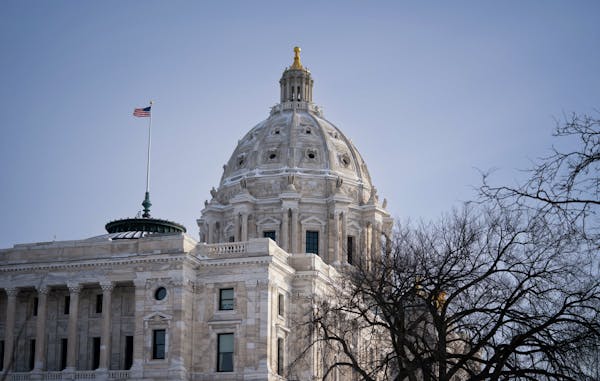Minnesota lawmakers began their third legislative session in the shadow of COVID-19 on Monday, with pledges from both sides of the aisle to address statewide anxieties around rising crime, a strained education system and the health and economic fallout of the pandemic.
"Today we start by recognizing how hard and unsettling these past two years have been for all of us," Senate Minority Leader Melisa López Franzen said during a morning news conference alongside her Senate DFL colleagues. "Every Minnesota family, community and business has been hit hard by the deadly pandemic that has upended our economy and strained our public health, our long-term care and our child-care systems to the brink. And Minnesotans are feeling it."
DFL Gov. Tim Walz and both parties in the divided Legislature have outlined lengthy — and at times dueling — lists of priorities in recent weeks, many signaling how leaders want to spend a projected $7.7 billion surplus. On the table are proposals for tax cuts, infrastructure borrowing, front-line worker bonuses, improving education outcomes, expanding access to affordable housing, reducing child-care and health care costs and tackling violent crime.
Republican Senate Majority Leader Jeremy Miller said the historic budget surplus gives both parties an opportunity to address rising crime and focus on kids in the classroom after nearly two years of on-and-off closures in response to the COVID-19 pandemic. Republicans also want to give back much of the surplus in permanent income tax cuts targeting lower and middle tax brackets and the elimination of taxes on Social Security income.
"When you have a surplus that large it means one thing: The state is collecting too much money from the taxpayers, so we are going to focus on permanent, ongoing tax relief so Minnesotans see more money in their pocket every single paycheck," Miller said.
Miller criticized Walz's proposal to use $700 million of the surplus on one-time tax rebates — which the governor called "Walz checks" — as "barely scratching the surface."
"We might be OK with a one-time payment, but you know what, it's got to be a heckuva lot larger than what the governor is proposing, and we're not going to call them a 'Walz check,'" he said. "It is not Gov. Walz's money, it's the people's money."
Republican House Minority Leader Kurt Daudt said that because legislators approved a budget during the last session, "it's tough to make the case now that we need to spend more on state government."
"I would go as far as to say that if we don't have permanent, ongoing tax relief, that likely the majority of that $7.7 billion surplus is going to sit unused," he said.
DFL House Speaker Melissa Hortman also expressed caution when it comes to spending the surplus, the updated amount of which won't be known until the revised February forecast. But House DFLers also intend to push for spending they say will help workers, including extending workers' compensation for front-line workers who contract COVID-19, replenishing the state's Unemployment Insurance Trust Fund — which was drained during the pandemic — and sending checks to front-line workers.
Legislators hit an impasse over who should qualify for $250 million in bonus pay and have yet to distribute the money. Walz and House Democrats are now suggesting bumping up the total to $1 billion.
"In a show of good faith, Democrats and Republicans working together, we could take care of Minnesota's workers and businesses in pretty short order — and this is money we have in the bank," Hortman said.
Although the pandemic's presence was palpable at the Capitol on Monday — with many faces hidden behind masks, restrictions on where members of the public could go and the option for members to attend meetings remotely — in some ways it was business as usual.
Legislators hugged and bumped elbows after returning in person to the Capitol after two sessions of mostly remote work. Senators stood and clapped when their colleague David Tomassoni, a Chisholm Democrat who has been diagnosed with ALS, was helped to his seat by his two sons.
Despite some restrictions in the House, the Capitol building is open to the public. Supporters of the Equal Rights Amendment gathered in the rotunda on the first day of session and unfurled a large copy of the Constitution over a marble banner with their proposed amendment codifying equal rights regardless of gender.
Walz and Lt. Gov. Peggy Flanagan walked between the House and Senate floors with napkins and two pans of bars to hand out to legislators as they arrived for the first day of session.
"We're starting off on a sweet note," said Walz, who is trying to persuade a divided Legislature to back his agenda of one-time tax rebates, more funding for classrooms and new funding for child care, paid family medical leave and front-line workers who responded to the pandemic.
"Republicans and Democrats have not always seen each other as the enemy," said Walz. "We've seen each other as wrong, we've seen each other as exasperating sometimes, but never that this was an enemy or someone who shouldn't be worked with, and I think it's harder to have that attitude when you're in the same place, when you're talking about your children."
On top of taxes and other debates, Walz said lawmakers can't lose sight of the fight against COVID-19, including health care worker shortages.
"The pandemic is still going on. There may be people gathering here who don't want to talk about COVID, but 29 Minnesotans died today from COVID. That's our best day in a long time," Walz said Monday. "We can simultaneously focus on the budget, focus on the future, but we need to stay in the present when it comes to COVID."
Trump receives NRA endorsement as he vows to protect gun rights

Biden and oil companies like this climate tech. Many Americans do not.
Alice Stewart, CNN political commentator and veteran political adviser, dies at 58
Georgia Republicans choose Amy Kremer, organizer of pro-Trump Jan. 6 rally, for seat on the RNC


